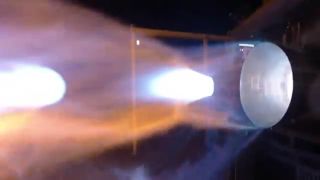KEY POINTS
- Jeff Bezos’ space company Blue Origin suffered a rocket engine explosion while testing its BE-4 rocket engine last month, CNBC has learned.
- During a firing on June 30 at Blue Origin’s facility in West Texas, a BE-4 engine detonated about 10 seconds into the test.
- A Blue Origin spokesperson confirmed the incident, noting no personnel were injured and an investigation is underway, with a “proximate cause” identified.
Jeff Bezos’ Blue Origin rocket engine explodes during testing

A Blue Origin rocket engine exploded during testing last month, CNBC has learned, a destructive setback with potential ramifications for the company’s customers and its own rocket. . .
During a firing on June 30 at a West Texas facility of Jeff Bezos’ space company, a BE-4 engine detonated about 10 seconds into the test, according to several people familiar with the matter. Those people described having seen video of a dramatic explosion that destroyed the engine and heavily damaged the test stand infrastructure.
The people spoke to CNBC on the condition of anonymity to discuss nonpublic matters.
The engine that exploded was expected to finish testing in July. It was then scheduled to ship to Blue Origin’s customer United Launch Alliance for use on ULA’s second Vulcan rocket launch, those people said.
A Blue Origin spokesperson, in a statement to CNBC on Tuesday, confirmed the company “ran into an issue while testing Vulcan’s Flight Engine 3.”
“No personnel were injured and we are currently assessing root cause,” Blue Origin said, adding “we already have proximate cause and are working on remedial actions.”
The company noted it “immediately” made its customer ULA aware of the incident. ULA is the rocket-building joint venture of Boeing and Lockheed Martin, which competes primarily with Elon Musk’s SpaceX, especially going head-to-head over the most lucrative military launch contracts."
Blue Origin's BE-4 rocket engine exploded during June 30 test: report

The BE-4 — the engine that will power Blue Origin's New Glenn rocket and United Launch Alliance's (ULA) Vulcan Centaur — exploded about 10 seconds into the test, which Blue Origin conducted at its West Texas facility on June 30, CNBC's Michael Sheetz reported on Tuesday (July 11).
People familiar with the anomaly "described having seen video of a dramatic explosion that destroyed the engine and heavily damaged the test stand infrastructure," Sheetz wrote.
The engine was being prepped to fly on the second launch of Vulcan Centaur, Sheetz wrote. Blue Origin confirmed that detail, as well as the testing incident, in a statement sent to CNBC.
"No personnel were injured, and we are currently assessing root cause," Blue Origin representatives said, according to Sheetz. Investigators have already determined the proximate cause of the anomaly "and are working on remedial actions," the statement added.
Blue Origin added that it immediately made ULA aware of the incident. And the latter company — a joint venture of Boeing and Lockheed Martin — doesn't seem to view it as a major problem at the moment.
The BE-4 has already been qualified for flight, meaning its overall design is sound, ULA President and CEO Tory Bruno stressed via Twitter on Tuesday. The engine that failed on June 30 was undergoing an "acceptance test" (APT), which looks for issues with individual units before flight. (There are other steps along this path as well, including "hot fire" tests of fully integrated engines on the launch pad.)
"ATP failures are not uncommon. That's why we do them on every single serial number that comes off the line," Bruno said in another Tuesday tweet.
It's unclear when the new rocket will get off the ground. Late last month, the company said it would destack the first Vulcan Centaur and send the upper stage back to its factory in Alabama for modifications.
We should learn more soon: Bruno is scheduled to talk to reporters about Vulcan Centaur on Thursday (July 13).
New Glenn, the other big rocket that the BE-4 will power, also has yet to fly. Its debut was originally targeted for 2020, but delays in the BE-4's development have pushed that timeline to the right repeatedly. Blue Origin has recently declined to provide a new target date, as Sheetz noted.
Join our Space Forums to keep talking space on the latest missions, night sky and more! And if you have a news tip, correction or comment, let us know at: community@space.com.
___________________________________________________________________________________




No comments:
Post a Comment